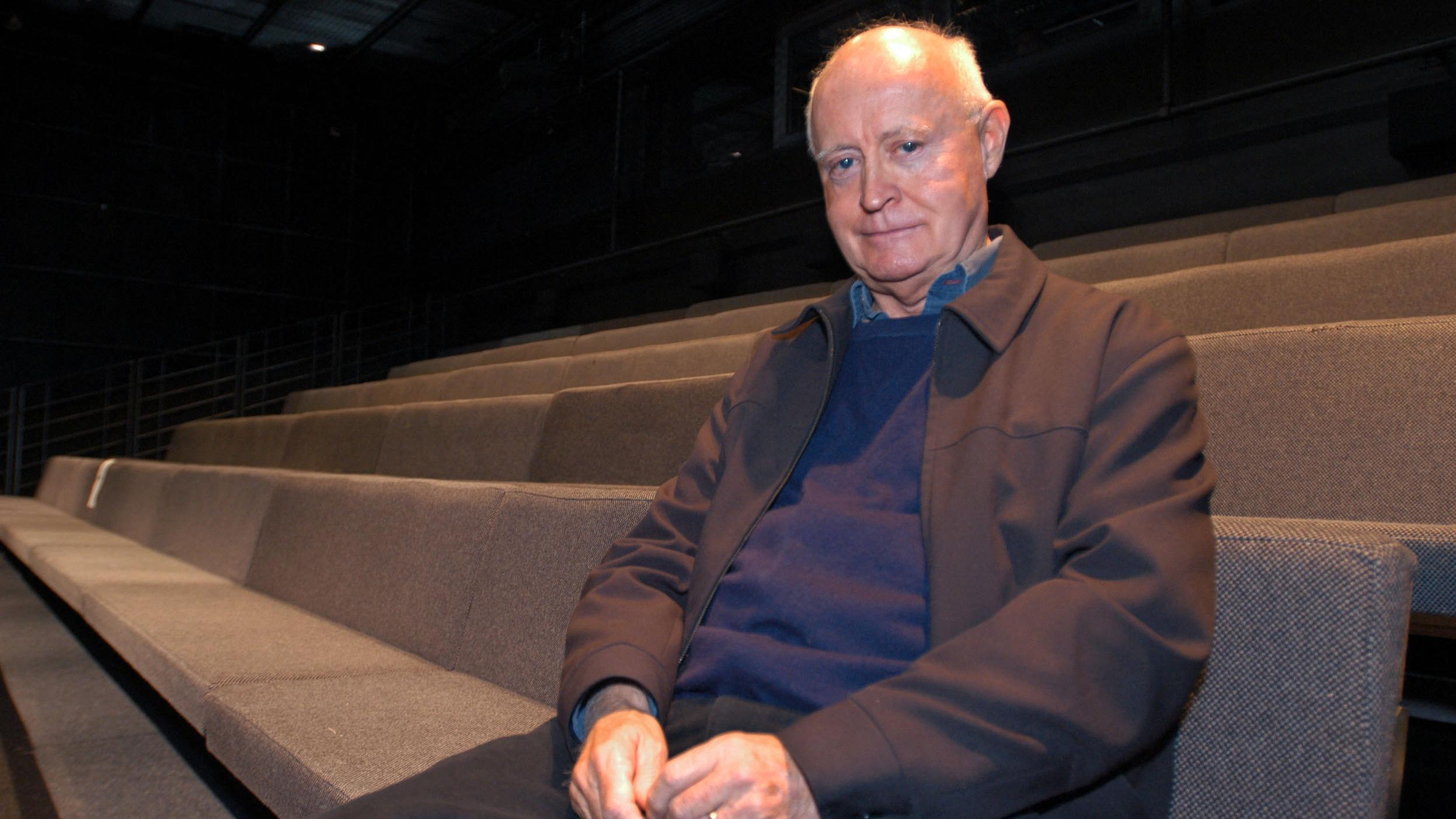“Has anyone since Brecht written more powerful theater than Edward Bond?” The question is from Philippe Tesson in a review of the play In the Company of Men, directed by Alain Françon at La Colline, in November 1997. Our late columnist thus confirmed "the preeminent place occupied by the British author in the 20th century theater. “But why not say more generally: in the history of theater, why limit Bond's contribution to the 20th century, why date Bond? What distinguishes him in fact is that he is more than a writer of his time, and that he is akin to the greatest, in the lineage of Greek theater. It would be wrong to reduce it to the dimensions of our century, which does not have the prerogative of violence and cruelty, even if it has pushed back the limits of these. It couldn't be said better, could it? So, needless to say: Edward Bond, who died on March 3, 2024 in Cambridge, had passed into posterity during his lifetime.
The playwright was born in 1934 in Holloway, a working-class district of north London, into a working-class family of peasant origin. Of his birth, he wrote this poem which sets the lyrical-popular tone of his work: “I was born at half past eight/in the evening on Wednesday July 18, 1934/there was a storm/An hour before my birth my mother washed the stairs of his building so that they would be clean when the midwife walked on them/ In the neighborhood where my mother lived, representatives of the medical profession were considered security agents (…)” He will remember, a little more later, bombings on London which, from the age of five to eleven, hammered his eardrums. He wrote, still in this same poem: “Like all people alive in the middle of this century or born since/I am a citizen of Auschwitz and a citizen of Hiroshima/I am a citizen of the human world which is still to be built. »
He came to the theater through the music hall where his sister worked and especially through the discovery of Shakespeare's Macbeth which he went to see with his class. He later admitted that he didn't understand much but he felt that something was happening there. That the human being was not as simple as he seems and that there is a knot of paradoxes within him. From then on, Edward Bond - who stopped his studies at the age of 15 and went to work in the factory, the best university for those who want to understand the harshness of humankind - was always in rebellion. He tried his hand, self-taught, at theater writing for around ten years but his first play was only published in 1961. It had the sublime title: Pope's Wedding. A title almost as good as Murder in the Cathedral by T.S. Eliot.
Also read: The Romeo: Shakespeare revisited in Avignon
The oldest among us will remember the scandal caused by his second play, Sauvés, created in 1965. In this text which describes the dull life of the sub-proletariat, the public was shocked by a scene of the stoning of an infant in his pram. Needless to say, the play was censored, which did not discourage the author since he produced Au petit matin in 1968, a satire of Victorian society. Bond's work would be like an experiment in limits and the problems it raises are for all eternity: the thirst for money and the power which lead and encumber men, their relationships of domination and submission, their ambitions...
Edward Bond leaves behind a masterful body of work. More than forty plays performed in major institutions – his “comedy” La Mer entered the repertoire of the Comédie-Française in 2016 – but also by more modest troupes. In addition to his theatrical work, Bond also wrote librettos for operas and ballets, screenplays for the cinema including Blow-Up by Michelangelo Antonioni which did not go unnoticed, radio and television plays, theoretical writings, etc. Like the writer Anthony Burgess, Edward Bond analyzed in his own way the problem of evil in our societies. And he is not far from thinking like the author of A Clockwork Orange that the violence of the State, of society, is much worse than that of the individual. And morality has nothing to do here.

 B:SM will break its investment record this year with 62 million euros
B:SM will break its investment record this year with 62 million euros War in Ukraine: when kyiv attacks Russia with inflatable balloons loaded with explosives
War in Ukraine: when kyiv attacks Russia with inflatable balloons loaded with explosives United States: divided on the question of presidential immunity, the Supreme Court offers respite to Trump
United States: divided on the question of presidential immunity, the Supreme Court offers respite to Trump Maurizio Molinari: “the Scurati affair, a European injury”
Maurizio Molinari: “the Scurati affair, a European injury” Inflation rises to 3.3% in April and core inflation moderates to 2.9%
Inflation rises to 3.3% in April and core inflation moderates to 2.9% Pedro Sánchez announces that he continues "with more strength" as president of the Government
Pedro Sánchez announces that he continues "with more strength" as president of the Government Irritable bowel syndrome: the effectiveness of low-carbohydrate diets is confirmed
Irritable bowel syndrome: the effectiveness of low-carbohydrate diets is confirmed Beware of the three main sources of poisoning in children
Beware of the three main sources of poisoning in children Relief at Bercy: Moody’s does not sanction France
Relief at Bercy: Moody’s does not sanction France More than 10 million holders, 100 billion euros: the Retirement Savings Plan is a hit
More than 10 million holders, 100 billion euros: the Retirement Savings Plan is a hit Paris 2024 Olympic Games: the extension of line 14 will open “at the end of June”, confirms Valérie Pécresse
Paris 2024 Olympic Games: the extension of line 14 will open “at the end of June”, confirms Valérie Pécresse Failing ventilators: Philips to pay $1.1 billion after complaints in the United States
Failing ventilators: Philips to pay $1.1 billion after complaints in the United States The Cannes Film Festival welcomes Omar Sy, Eva Green and Kore-Eda to its jury
The Cannes Film Festival welcomes Omar Sy, Eva Green and Kore-Eda to its jury Prisoner in Israel, a Palestinian receives the International Prize for Arab Fiction
Prisoner in Israel, a Palestinian receives the International Prize for Arab Fiction Harvey Weinstein, the former American producer hospitalized in New York
Harvey Weinstein, the former American producer hospitalized in New York New success for Zendaya, tops the North American box office with Challengers
New success for Zendaya, tops the North American box office with Challengers Skoda Kodiaq 2024: a 'beast' plug-in hybrid SUV
Skoda Kodiaq 2024: a 'beast' plug-in hybrid SUV Tesla launches a new Model Y with 600 km of autonomy at a "more accessible price"
Tesla launches a new Model Y with 600 km of autonomy at a "more accessible price" The 10 best-selling cars in March 2024 in Spain: sales fall due to Easter
The 10 best-selling cars in March 2024 in Spain: sales fall due to Easter A private jet company buys more than 100 flying cars
A private jet company buys more than 100 flying cars This is how housing prices have changed in Spain in the last decade
This is how housing prices have changed in Spain in the last decade The home mortgage firm drops 10% in January and interest soars to 3.46%
The home mortgage firm drops 10% in January and interest soars to 3.46% The jewel of the Rocío de Nagüeles urbanization: a dream villa in Marbella
The jewel of the Rocío de Nagüeles urbanization: a dream villa in Marbella Rental prices grow by 7.3% in February: where does it go up and where does it go down?
Rental prices grow by 7.3% in February: where does it go up and where does it go down? Europeans: a senior official on the National Rally list
Europeans: a senior official on the National Rally list Blockade of Sciences Po: the right denounces a “drift”, the government charges the rebels
Blockade of Sciences Po: the right denounces a “drift”, the government charges the rebels Even on a mission for NATO, the Charles-de-Gaulle remains under French control, Lecornu responds to Mélenchon
Even on a mission for NATO, the Charles-de-Gaulle remains under French control, Lecornu responds to Mélenchon “Deadly Europe”, “economic decline”, immigration… What to remember from Emmanuel Macron’s speech at the Sorbonne
“Deadly Europe”, “economic decline”, immigration… What to remember from Emmanuel Macron’s speech at the Sorbonne These French cities that will boycott the World Cup in Qatar
These French cities that will boycott the World Cup in Qatar NBA: young Thunder coach Mark Daigneault named coach of the year
NBA: young Thunder coach Mark Daigneault named coach of the year Athletics: Noah Lyles in legs in Bermuda
Athletics: Noah Lyles in legs in Bermuda Serie A: Dumfries celebrates Inter Milan title with humiliating sign towards Hernandez
Serie A: Dumfries celebrates Inter Milan title with humiliating sign towards Hernandez Tennis: no pity for Sorribes, Swiatek is in the quarterfinals in Madrid
Tennis: no pity for Sorribes, Swiatek is in the quarterfinals in Madrid

















